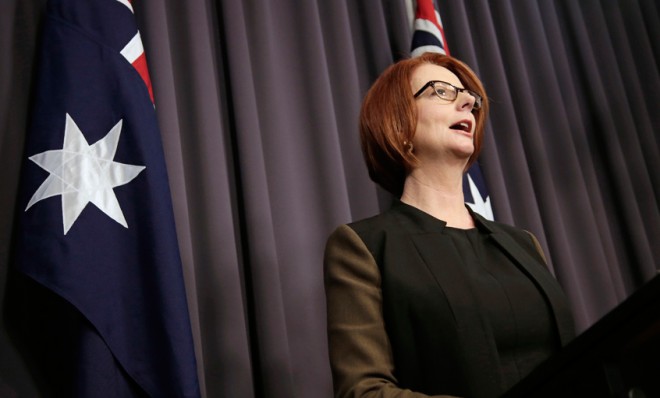Why Australia's Labor Party ousted its own prime minister
Julia Gillard was not only ousted from office, but is leaving politics altogether. And elections aren't even for another few months


A free daily email with the biggest news stories of the day – and the best features from TheWeek.com
You are now subscribed
Your newsletter sign-up was successful
Australian Prime Minister Julia Gillard deposed Labor Party colleague Kevin Rudd in a dramatic 2010 party coup. On Wednesday, Rudd returned the favor, when a committee of Labor leaders voted to put him back at the head of the party in a closed-door, 57-to-45 vote. Gillard, Australia's first female prime minister, said she would ask Governor-General Quentin Bryce to swear Rudd in as her replacement.
Gillard also said she is quitting politics — a condition she herself placed on the loser of the contest when she called for the vote. This was Rudd's third challenge to Gillard since being ousted by her in 2010, and there was a very personal element to his victory, says Nick Bryant at BBC News. In effect, "Rudd has exacted revenge on Julia Gillard, his one-time friend and deputy who ruthlessly deposed him."
As for why the party went along with Rudd's third challenge, a mere three months after his second ouster attempt failed to really even get off the ground, "the calculation being made by Labor supporters is simple," says Neil Hume at the Financial Times:
The Week
Escape your echo chamber. Get the facts behind the news, plus analysis from multiple perspectives.

Sign up for The Week's Free Newsletters
From our morning news briefing to a weekly Good News Newsletter, get the best of The Week delivered directly to your inbox.
From our morning news briefing to a weekly Good News Newsletter, get the best of The Week delivered directly to your inbox.
An opinion poll on Tuesday projected that Labor under Ms. Gillard would lose 35 of its 71 seats in September's election. A second survey suggested that the return of Mr. Rudd as prime minister would deliver a 6-point lift in Labor's primary vote and save up to 18 seats. Few believe a Rudd-led Labor party can win the election. But his return offers the chance to staunch some of the damage that the party is likely to suffer at the polls. [Financial Times]
The projected winner in September is Tony Abbott, who leads the opposition Liberal-National coalition. It's not that Abbott is particularly popular, says the Financial Times' Hume, but he's getting a lot of mileage out of Labor's unpopularity. Rudd, "widely considered Australia's most popular politician," could turn Labor's fortunes around — or not.
Abbott may not be popular, but his proposals to scrap the Labor-enacted carbon tax and be tougher on asylum-seeking foreigners is polling well. "The Labor party may well change its leader, but it doesn't matter who leads the Labor party, it will still be much the same government with much the same policies," Abbott told reporters on Wednesday.
Aside from the eye-for-an-eye narrative, Labor's ousting of Gillard also signals lawmakers' desire for self-preservation, says the BBC's Bryant. "Labor is not only one of the most brutal political parties in the world, but also one of the most calculating and pragmatic," and it's not just generic members of parliament who were predicted to lose their seat under the outgoing prime minister. Many of the senators and cabinet ministers who voted Wednesday "calculate Mr. Rudd will at least prevent an electoral wipe-out, and maybe help save their own seats," too.
A free daily email with the biggest news stories of the day – and the best features from TheWeek.com
Peter has worked as a news and culture writer and editor at The Week since the site's launch in 2008. He covers politics, world affairs, religion and cultural currents. His journalism career began as a copy editor at a financial newswire and has included editorial positions at The New York Times Magazine, Facts on File, and Oregon State University.
-
 Local elections 2026: where are they and who is expected to win?
Local elections 2026: where are they and who is expected to win?The Explainer Labour is braced for heavy losses and U-turn on postponing some council elections hasn’t helped the party’s prospects
-
 6 of the world’s most accessible destinations
6 of the world’s most accessible destinationsThe Week Recommends Experience all of Berlin, Singapore and Sydney
-
 How the FCC’s ‘equal time’ rule works
How the FCC’s ‘equal time’ rule worksIn the Spotlight The law is at the heart of the Colbert-CBS conflict
